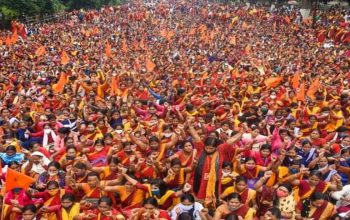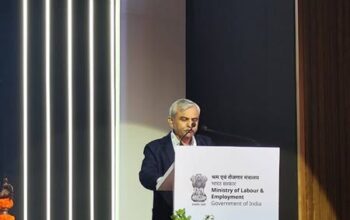Source :- Understanding B.R.Ambedkar
Ambedkar’s concern for labour was not only at the policy level but also at the political level. He floated the Independent Labour Party (ILP) in August 1936 which projected itself as a party of workers. The programme of the ILP, published in 1937, described it as a ‘labour organisation in the sense that its programme was mainly to advance the welfare of the labouring classes’. It supported state ownership and management where necessary, but even for workers its stress was on what is called the ‘unorganised sector’.
Offering land resettlement and public works to aid the unemployed and landless, it promised the following:
To legislate measures to save peasants from the clutches of money lenders
To put up a strong opposition to land revenue
To campaign for a more equitable system of tax
To establish land mortgage banks and agricultural producers’ cooperatives and marketing societies.
It also promised protection to tenants and khot landlords.
More can be understood about his views on protecting the interest of the labour by reading some of the volumes of a weekly named Janata founded by him in the 1930s. The weekly stated that the existing political parties, particularly the Congress, had betrayed the workers as they were under the control of capitalist powers. It also criticised the Gandhian attempts to organise an alternative trade union centre based in Ahmedabad, Mazdur Mahajan, following the ‘trusteeship’ principle. Ambedkar was of the opinion that this attempt by Gandhi would split the working class movement. The ILP was projected as a party of workers and peasants and quintessential for the fight against the imperial powers. In the provincial elections held in 1937, ILP won 14 seats out of the 17 it contested. This included 11 reserved (out of 13) and 3 general seats (out of 4). Soon thereafter, ILP got involved in a number of mass struggles of workers and peasants, in particular the fight for the abolition of khoti landlordism, climaxing into a march of 20,000 peasants to the Bombay council hall on 12 March 1938. To break this unity of workers led by Ambedkar and other Communist leaders, the Congress government in Bombay started using emergency powers and
introduced an Industrial Disputes Bill in the Bombay Legislative Assembly in September 1938. This Act, also known as the first of the ‘black acts’ against Bombay workers, made conciliation compulsory and, under certain very ill-defined conditions, made strikes illegal. Ambedkar was quick to expose the anti-labour nature of the bill, describing it as the ‘Workers’ Civil Liberties Suspension Act’ and defended the ‘right to strike’ of the workers as equivalent to the ‘right to freedom’. He made it clear that under conditions described in the Bill, India once
and for all would lose the possibility of any free union growing up in the country.The one-day general strike of textile workers with the support of ILP, the Communists and the moderates, on 15 November 1938 was an attempt to register their protest. He addressed several conferences outside the legislature concerningthe problems of Indian labour.
India, in the meantime had become a founder member of the International Labour Organisation (ILO), established in 1919, the only non-independent country to be so. In 1928, the ILO opened a branch ofûce in Delhi, the ûrst in Asia. As a consequence, India had adopted the ILO’s tripartite principle (of coming together of government, business and labour) early on. In 1942, the Government of India set up a permanent Tripartite Labour Organisation, which included a committee on conventions to examine ILO standards. The Governnment also organized an Indian Labour Conference, named Tripartite National Labour Conference. The first Tripartite National Labour Conference was held on January 22 and 23, 1940, the second on January 27 and 28, 1941, and the third on January 30 and 31, 1942. Ambedkar, as a member holding the portfolio of labour in the Viceroy’s Executive Council (1942-46), addressed the fourth Tripartite National Labour Conference
on 7 August 1942 in New Delhi. It was during this conference that for the first time representatives of employers and employees were brought face-to- face within the ambit of a joint conference. It was at this conference and later that Ambedkar spoke both about the universality of labour legislation and labour’s internationalism.
Ambedkar visited Dhanbad in December 1943 to enquire about the conditions of coal labourers. He visited several collieries himself and even went down to a 400 feet deep mine to see the conditions of coal cutter labourers. He closely watched the condition of female labourers and the amenities provided by the government and the colliery owner. He also visited Koderma in April 1944 to see mica mines to understand the problems of mica labourers. Addressing the meeting of Mica Mines Council, he said, “If sufficient wages will not be paid to labourer, no reform will be possible. It is the duty of the Mica Company Owner to take steps for the upliftment of the living standards of the labourer.” After these visits, Ambedkar argued that all industries should establish equal pay for equal work irrespective of sex. He advocated workers getting paid holiday. Later, on his recommendations, the following were implemented:
A labour welfare fund was set up
Working hours were reduced from 10 hours to 8 hours
Female labourers were given maternity leave.
Addressing the fourth Tripartite National Labour Conference on 7 August 1942 in New Delhi, Ambedkar emphasised that one of the primary objectives of such conferences was to look for mechanisms to avoid the danger arising out of diversity in labour legislation. He believed that as long as the Government of India was a unitary government, uniformity in labour legislation was not difficult.However, with the federal constitutional structure created after the enactment of the Government of India Act 1935, labour was placed in the concurrent legislative
list and this generated the problem of uniformity. It was feared that in the absence of any central legislation, provinces might choose to make laws to suit their own interests. Thus, in the given conditions, it became important to curb this tendency and create an atmosphere among provincial governments to work for the principle of uniformity in labour legislation. In a country as large as India, uniformity in labour legislation will always remain a matter of importance. With such wide administrative and provincial jurisdictions, it is utmost important that industrial disputes both over capital and labour should be solved with uniformity and sensibility. Setting up bodies at the centre alone
would not work, as labour is much more concerned with provincial government. A body set up at the top would require to be supported from the bottom, and therefore provincial governments also need to set up similar bodies in their own provinces to deal with questions with which the central organisation deals. Ambedkar believed that labour achieves security through legislation. It obtains the right to safety, care and attention, through the conditions of welfare enforced by the government upon the employers for the benefit of labour. But labour’s security is not ensured merely with fair conditions of work. What labour wants is fair conditions of life, obtained through fair conditions of liberty, equality, and fraternity.
In the context of labour, he believed the three principles had the following definitions:
Liberty, is not merely the negative conception of absence of restraint; it involves the idea of government by the people, not only in name, as in parliamentary democracy, but in fact as well. Liberty of labour means ensuring that the state ensures right to equal opportunity and provides the fullest facilities for growth to every individual according to his needs.
Equality means the abolition of privileges of every kind in law, in thecivil service, in the Army, in taxation, in trade and in industry: in fact theabolition of all processes which lead to inequality.
Fraternity means unifying all classes and all nations.
It was under his leadership that the Government of India took keen interest in dealing with industrial problems and problems of labour welfare and undertook the responsibility of ensuring the right to prescribe fair wages and fair conditions of service. The standing committee,
which was set up by him in 1942, met thrice in a year and in addition to discussing the Wartime Labour Legislation, also discussed issues such as the following:
Hours of work;
Earnings of labour;
Dearness allowances;
Rounding-off wage payments in view of shortage of small coins;
Supply of essential food articles to labour;
Consideration of a fair wage clause in government contracts;
Appointment of labour officers in industrial undertakings; and
Collection of statistics under the Industrial Statistics Act.
He was very critical of the fact that despite 12 years of the passing of the
recommendations of the Royal Commission on Labour (which submitted its report
in 1929), neither the employers had shown any willingness to recognise trade
unions voluntarily, nor the provincial governments have acted to ensure that. He,
therefore, moved the Indian Trade Unions (Amendment) Bill in November 1943
for:
compelling employers to recognise trade unions
making any attempt by any employer, of non-recognition of a trade union (which has observed all the conditions prescribed in this measure and which has therefore qualified itself for recognition), an offence punishable by law.
During his tenure, Ambedkar took steps to amend the Maternity Benefits Act and the Workmen Compensation Act of 1923. In 1944, Ambedkar initiated to amend the Factories Act of 1934 with several modifications. According to the modifications, all industries were required to provide washing facilities for workers (Section 19). Changes also took place in working hours (clause 2) and earned leave facilities. The modifications also clarified that the only condition required for a worker to claim seven days holiday was that the worker had worked for a period of 12 months in continuity. The Bill also provided for what should be considered as interruptions and declared certain interruptions, such as interruptions arising out of sickness, accident, authorized leave, lock-out period and a strike period, provided the strike is legal, valid for claiming as holidays with pay. On holidays with pay for factory workers, Ambedkar opined that a worker is to
be paid at a rate equivalent to the average of his earnings during the three preceding months barring overtime. He followed the British pattern of 48 hours of working hours per week and opposed the practice of 12 hours work in industry
by workers.
He also moved the Payment of Wages (Amendment) Bill in November 1944. He was opposed to Section 5 of the Payment of Wages Act, which had classified factories into two categories:
1) Category No. 1: factories with workmen fewer than 1,000 and
2) Category No. 2: factories with workmen more than 1,000.
After making this division, the section provided that in the factories which fall into category No. 1, payment of wages must be made within 7 days, while in the case of the latter the limit of the period is prescribed to be 10 days. He opposed this provision on the ground that the number of workmen was never a constant figure; it always changes. For instance, if the number of employees goes down by one, the category automatically shifts from No. 2 to No. 1. Similarly, if the number of employees is increased by one, category No. 1 goes into category
No. 2. He believed that this classification was discriminatory and also non-feasible administratively. Ambedkar recommended amendment in Section 5 to bring uniformity. Whether the factory was seasonal or perennial, every discharged
workman was to be paid within 7 days after this amendment. He also moved a Bill for protection of minimum wages in April 1946 and the
same was enacted into law on 9 Feb 1948. He vehemently opposed the Industrial Employment (Standing Orders) Bill introduced in the Central Assembly in April 1946. But despite his opposition, the Bill was passed and came into force on 23 April 1946. During his period as a labour member, Ambedkar also invited V. V. Giri to head the commission on ‘Forced labour’. But the commission could not be established because the Indian Princes protested to the Viceroy against the idea of such a commission.





